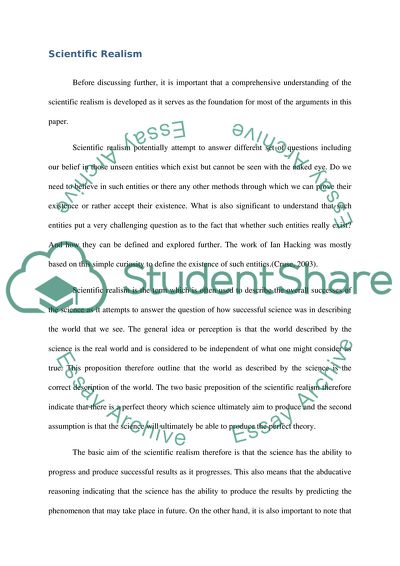Cite this document
(Entity Realism and Theory Realism and the Position of Ian Hacking Research Paper, n.d.)
Entity Realism and Theory Realism and the Position of Ian Hacking Research Paper. Retrieved from https://studentshare.org/philosophy/1567965-the-vast-majority-of-experimental-physicists-are-realists-about-entities-without-a-commitment-to-realism-about-theories-the-experimenter-is-convinced-of-the-existence-of-plenty-of-inferred-and-unobservable-entities-but-no-one-in-the-lab-believes-in
Entity Realism and Theory Realism and the Position of Ian Hacking Research Paper. Retrieved from https://studentshare.org/philosophy/1567965-the-vast-majority-of-experimental-physicists-are-realists-about-entities-without-a-commitment-to-realism-about-theories-the-experimenter-is-convinced-of-the-existence-of-plenty-of-inferred-and-unobservable-entities-but-no-one-in-the-lab-believes-in
(Entity Realism and Theory Realism and the Position of Ian Hacking Research Paper)
Entity Realism and Theory Realism and the Position of Ian Hacking Research Paper. https://studentshare.org/philosophy/1567965-the-vast-majority-of-experimental-physicists-are-realists-about-entities-without-a-commitment-to-realism-about-theories-the-experimenter-is-convinced-of-the-existence-of-plenty-of-inferred-and-unobservable-entities-but-no-one-in-the-lab-believes-in.
Entity Realism and Theory Realism and the Position of Ian Hacking Research Paper. https://studentshare.org/philosophy/1567965-the-vast-majority-of-experimental-physicists-are-realists-about-entities-without-a-commitment-to-realism-about-theories-the-experimenter-is-convinced-of-the-existence-of-plenty-of-inferred-and-unobservable-entities-but-no-one-in-the-lab-believes-in.
“Entity Realism and Theory Realism and the Position of Ian Hacking Research Paper”. https://studentshare.org/philosophy/1567965-the-vast-majority-of-experimental-physicists-are-realists-about-entities-without-a-commitment-to-realism-about-theories-the-experimenter-is-convinced-of-the-existence-of-plenty-of-inferred-and-unobservable-entities-but-no-one-in-the-lab-believes-in.


